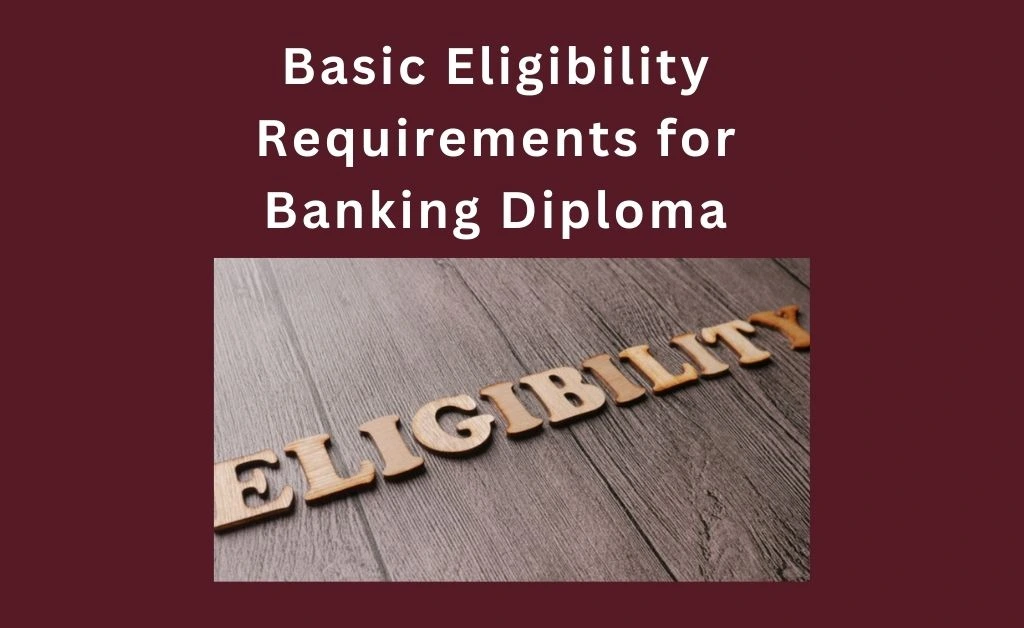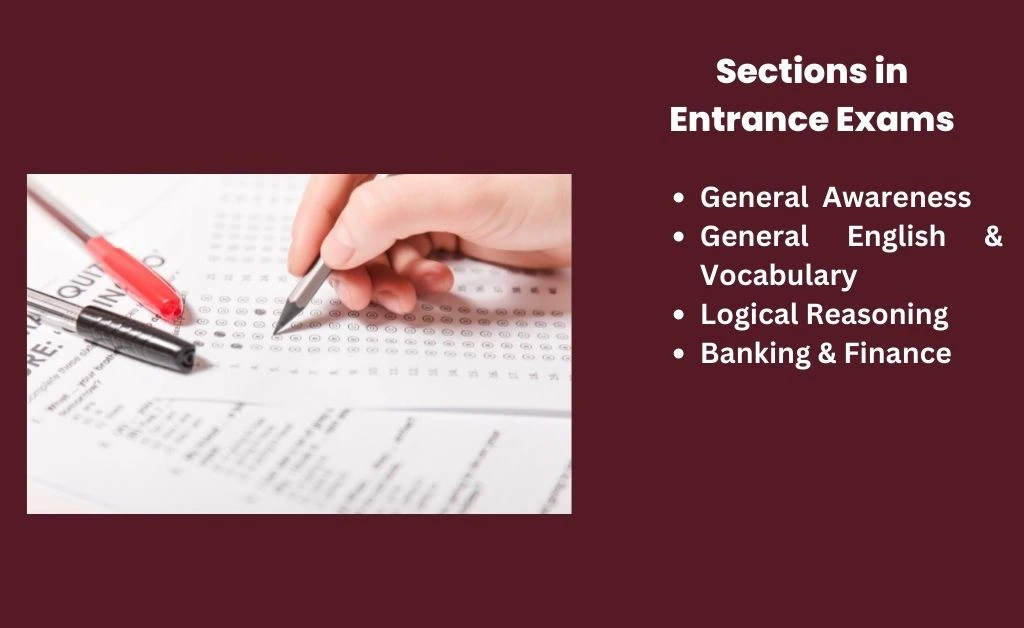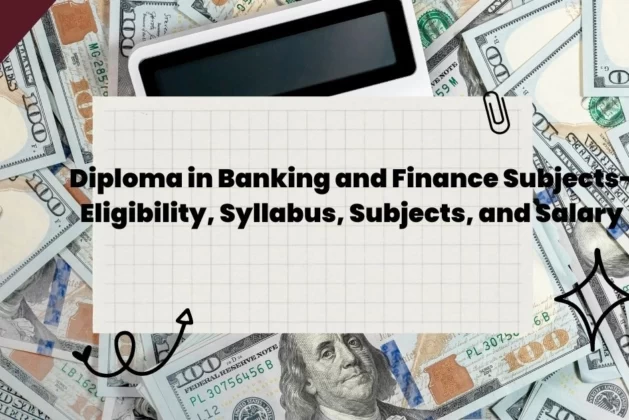Table of Contents
ToggleOverview
Are you looking to kickstart your career in the banking and finance industry? If so, a Diploma in Banking and Finance may be just what you need! This diploma program is designed to equip students with the knowledge and skills required for a successful career in this field. In this blog post, we will explore everything you need to know about Diploma in Banking and Finance subjects, eligibility requirements, courses offered by universities, job prospects, salary expectations, and more!
Course Highlights
|
Course Name |
Diploma in Banking and Finance |
|
Course Level |
After Class 12th or Graduation |
|
Duration |
1 year |
|
Examination type |
Semester |
|
Eligibility |
12th or any bachelor’s degree or any exam with an aggregate of at least 50 % |
|
Admission Process |
Merit-Based or Entrance Based |
|
Average Fees |
India- INR 10,000- 40,000 Abroad- 5-9 Lakhs per year |
|
Average Salary |
INR 3 to 7 Lakhs per annum |
|
Job Positions |
Financial Analysts, Loan Officers, Investment Bankers, Credit and Risk Managers, Internal Auditors, Financial Consultants, and so on |
|
Top Recruiters |
Banking, Credit Administration, Auditing Departments, Corporate Banking Sectors, Financial Consultants, and so on. |
Why Pursue a Diploma in Banking and Finance?
Here are some reasons why pursuing a Diploma in Banking and Finance might be the right choice for you:
- It will equip you with the essential skills required to work in the banking sector. You’ll get an understanding of financial planning, accounting principles, business economics, investment management, risk assessment, and more.
- Obtaining a Diploma in Banking and Finance showcases your interest and commitment to learning about this field. It can help distinguish you from other candidates when applying for jobs or internships in related industries.
- It is designed to prepare students with practical knowledge that they can apply on the job immediately after graduation. The education provided is not just theoretical but also includes hands-on experience through case studies, simulations projects, or real-life internships/ job placements.
- Students get the opportunity to gain in-depth knowledge of both Domestic and International Banking fields that helps them to learn about the functioning of markets in an economy and across the country.
- Pursuing a diploma program typically takes less time than getting a full-fledged degree. This allows graduates to enter into entry-level positions sooner while having good earning potential with ample opportunities for professional growth within their respective organizations.
Basic Eligibility Requirements

- The candidate must have completed their 10+2 education from a recognized board or institution. Additionally, some universities may require a minimum aggregate percentage in order to qualify for admission into their diploma program.
(This percentage requirement varies from university to university.)
- In some colleges like MIT Pune and NMIMS admissions happen through entrance tests too.
- Candidate should have at least 2 Years of work experience in the same field.
- TOEFL, PTE, Cambridge English, and IELTS Academic a major English proficiency tests.
How to Prepare for Entrance Exams Required for Diploma

General Awareness: Keep yourself updated by reading the newspaper daily for even 2 minutes, having a newspaper application on your phone also works well. You are traveling or out somewhere, you just need your phone and it’s sorted.
General English & Vocabulary: Read, read, and read a lot more. Nothing can help you improve your vocabulary and English as reading does. Also, what might work for you is watching English content on youtube.
For example- If you like watching educational content start watching them in English though, with subtitles, or if you’re someone who loves watching movies you can watch English movies to entertain yourselves and also to improve your English at the same time.
Logical Reasoning: You can take references from books or online study materials. There are a lot of free sources too like- Unacademy or testbook that help you in preparing for such sections.
Banking & Finance: This may include a lot of topics and basic questions from commerce, accounts, and business studies from class 11th and 12, so you can prepare from them.
Also, check Banking courses after Graduation,
Syllabus of Diploma Course
This syllabus is divided between the theoretical portion and case studies. The exams happen at the end of every semester with the submission of assignments and projects.
|
Semester 1 |
Semester 2 |
|
Principles & Practices of Banking |
Marketing of Financial Services |
|
Legal & Regulatory Aspects of Banking |
Business Communication and Etiquette |
|
Business Economics |
Taxation – Direct and Indirect |
|
Corporate Social Responsibility |
Information Systems for Managers |
|
Organizational Behavior |
Business Law |
|
Accounting & Finance for Bankers |
Retail Banking |
Courses and Universities Offering Diploma
There are several universities and institutions around the world that offer diploma courses in banking and finance, each with its own unique set of subjects and areas of focus.
Some popular courses include
- Financial Accounting
- Principles of Investment
- Banking Law & Practice
- Business Communication Skills
- International Finance Management
- Risk Management in Banks
These courses not only help students gain knowledge about the financial industry but also develop their analytical skills.
In India alone, there are numerous universities offering this course such as
- Symbiosis Centre for Distance Learning (SCDL)
- Institute of Banking & Finance (IBF)
- Indian Institute Of Banking And Finance (IIBF)
Similarly, there are some globally recognized institutions like
- London School of Economics (LSE)
- New York University Stern School of Business
- Harvard Business School
(Note: Language tests like TOEFL, and IELTS are mandatory for global programs)
Read more about Top Investment Banking Companies
Documents Required

- Academic transcripts or certificates from previous education institutions. This includes high school certificates and any tertiary education qualifications.
- Identification documents such as a Passport or National ID card will be necessary for international students or those who do not reside in the country where they are studying.
- Proof of language proficiency may also be required if the course is taught in a different language than the student’s first language. This can include results from English language tests like IELTS or TOEFL.
- Sometimes you may also need to provide letters of recommendation from teachers/professors who can attest to their academic abilities and work ethics.
- Universities may require additional documentation such as medical certificates or police clearance checks depending on the location of study and course requirements.
Job Prospects

A Diploma in Banking and Finance opens up a wide range of job opportunities in both the public and private sectors. The banking industry is one of the most rapidly growing industries, offering numerous career options to qualified individuals.
After completing this diploma, you can work as a bank officer, loan officer, investment analyst, financial advisor or even as an equity research analyst. You will have skills that are highly valued in various other fields like accounting firms and insurance companies.
The demand for financial experts with specialized knowledge has increased considerably over the years; thus job prospects after obtaining this diploma are bright.
Moreover, there is ample scope for growth within the banking sector itself. With experience and further education like MBA (Finance), you could easily climb up the corporate ladder.
Pursuing a Diploma in Banking and Finance can be a smart move if you want to enter into the world of finance without spending too much time on higher studies but still gain an edge over your competition when it comes to employability.
Average Salary: Diploma in Banking and Finance
One important aspect that individuals consider this Diploma course is the average salary they can expect and also a lot of lucrative job opportunities.
The average salary varies depending on several factors such as location, experience, and the type of employer. However, on average, a person with this diploma can expect to earn between $40,000 – $80,000 annually.
Entry-level positions typically pay around $40k per year while mid-level positions may offer salaries ranging from $50k-$70k per year. Senior-level roles often come with more significant responsibility and higher remuneration packages of up to or over $80k yearly.
By continually upgrading skills through further education or work-related training programs like MBA or CFA courses combined with relevant experience has prospects for growth within the industry.
Conclusion
As we come to the end of this blog, it is important to reflect on what we have learned about pursuing a Diploma in Banking and Finance. Through our exploration of the subject matter, we have discovered that there are a variety of courses and universities available for those interested in pursuing this field.
Additionally, we have discussed the basic eligibility requirements one must fulfill in order to pursue this Diploma including language proficiency tests and necessary documents. Furthermore, we’ve explored various job prospects within the industry as well as average salaries one can expect upon completion of their diploma.
It’s clear that a career in banking and finance holds great potential for those willing to put forth the effort required. With so many opportunities available across multiple industries and sectors around the world today – from investment banking firms like Goldman Sachs or JPMorgan Chase & Co., commercial banks such as Citigroup Inc., financial services companies like American Express Co., etc.- there has never been a better time than now to pursue your dreams!
Frequently Asked Questions (FAQs)
Yes, pursuing a diploma in banking and finance is a great way to gain practical knowledge of the industry. The course can lead to various job opportunities with good salaries.
The basic eligibility requirement is a high school certificate or equivalent qualification from any recognized board.
Popular courses include accounting, financial management, risk management, investment analysis, business communication skills, legal aspects of banking, and operations management.
Yes, if you are not fluent in English then you may need to take an English proficiency test like TOEFL or IELTS as per university guidelines.
Documents required vary by institution but generally include copies of educational certificates/mark sheets/transcripts along with passport-sized photographs.



